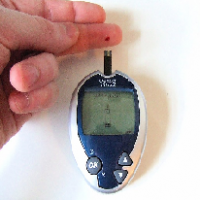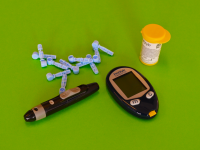
I don’t even recall how I came to be watching Dr. Jason Fung’s videos on Youtube. It might have been that I was busy at the time, I often have videos playing while I’m doing things and don’t have immediate access to change the next one that auto-plays; someone might have sent me to one for a specific reason and then autoplay happened. I don’t know how I got there; it’s not something I’d have searched for.
But somehow, I was watching a bunch of his videos and I was extremely skeptical.
I recall way back when Dr. William Davis, who I was following closely in the pre-Wheat Belly days in order to learn how to reduce the risk of a second heart attack, claiming some of his patients had been “cured” of diabetes. I argued with him extensively for using that terminology.
I really hate when anyone says that. If you get your A1c down to the normal range, you have very well-controlled diabetes, but excellent control is not a cure.
Early in our marriage, my husband ate 1/6 of a double layer chocolate cake and I did a homemade GTT on him; his bG never got as high as 80. *That* would be a cure; if your body still can’t handle glucose without going nuts, you’re not “cured.”
To me, the whole notion of “reversing” diabetes doesn’t sound a whole hell of a lot better than a cure, which was what Fung was selling. It smacks of a snake oil salesman; everyone with an iota of knowledge knows that T2 is a chronic and progressive disease.
I’m living proof; I controlled for most of 2 decades, then lost control after a bout of pancreatitis and wound up on insulin. I am diabetic as hell and decades of doing a low carb diet didn’t fix it. Control, even when I had the prettiest A1c you could imagine, did not equal not being diabetic anymore.
Fung made some points on his videos that stood out to me. First, he noted that those who had bariatric surgery often got off diabetic medications. I had never really looked into it, having never been large enough to qualify for the surgery, and thinking it was stupid anyway, so it was irrelevant to my life. I assumed it was just weight loss; I’ve lost and gained 20 or 30 pounds and had to change my insulin dosage; we know weight loss improves insulin resistance.
But then he showed a slide that indicated most of those folks got off their medications before they had significant weight loss. Hmmm… what is that about?
The implication was that people after the surgery were near-fasting. Some other study he showed had evidence that one loses 80% of liver fat in two weeks of fasting, which massively improves insulin resistance. Another showed that reduction of pancreatic fat improved beta-cell activity, allowing more insulin production.
Those two facts hit me pretty hard: if you reduce insulin resistance and improve insulin production, how is that not reversing diabetes?
I heard so many videos back-to-back that I can’t even identify what was in which video. I was binging on Fung. Partway through, I picked up my phone and ordered his book, “The Diabetes Code” for my Kindle. At the time, the cost was $2.99 and I thought to myself that if he was a snake oil salesman, he wasn’t very good at it.
But I kept watching videos while the book was downloading. While I was excited about the new belief that it might actually be possible to reverse diabetes, I hadn’t quite had my epiphany yet.
I *knew* all my health problems sprang from insulin resistance. I knew every damned problem from the heart attack to the necrotizing fasciitis to the congestive heart failure all began with insulin resistance and had spent years reading the literature, trying desperately to figure out what causes insulin resistance. That was the root problem I began with; that was what needed to be fixed.
And when Fung said it, I was blown away by the simplicity of it: insulin causes insulin resistance!
Of course, I knew that. I have often counseled folks with hypoglycemia that if they didn’t get it under control, they’d become diabetic. While it’s counter-intuitive to think hypoglycemia could lead to hyperglycemia, it occurs because hypoglycemia is that state in which the body overreacts to glucose by producing too much insulin; producing too much insulin eventually leads to insulin resistance and thus metabolic syndrome, pre-diabetes and eventually diabetes.
I knew that a T2 like myself was producing very high levels of insulin prior to diagnosis, that is how someone with metabolic syndrome maintains normal bG for a period of time, by producing more insulin.
Generally, T2s make more insulin than normal people. This tends to be true even when they’re actually on insulin, the insulin is not to save their lives as is the case with a T1, but to overcome the insulin resistance which has increased past the ability of their own insulin production to overcome it.
Somehow, though I knew insulin could cause insulin resistance, the implications of this had never occured to me. I was shooting 100 u of insulin a day, which honestly was just a half-assed treatment as my bG still shot up over 300 periodically. I couldn’t be futzed with all the measuring and counting and finding my ratios anymore; tight bG control had not been worth the cost.
But… insulin causes insulin resistance!
So why exactly am I shooting this stuff into my belly several times a day?
OK, so that was the primary epiphany, but there were several others that hit me as I watched Fung’s videos and read his book.
Back when I began on insulin, I knew that both elevated insulin and elevated bG were inflammatory. I had to decide which was worse. Fung’s interpretation of the ACCORD study indicated that insulin was worse; those with tight bG control had worse health outcomes than those with looser control.
Well, you can’t get that much looser than what I had been doing lately. Good for me, I guess.
How did we come to focus on bG as the problem instead of insulin?
That’s an easy one; we can measure bG. We can poke ourselves after every meal and find out which foods cause the worst bG spike. Every time some manufacturer came out with a new food, Dreamfield’s pasta, the newest sugar alcohol, I and those like me poked our fingers to quickly determine if it was valid or not.
I was in various groups where that’s what we did. And those of us who were diabetic in normal lowcarb groups reported our results to the non-diabetics.
We could test bG, so we focused on it; there was no easy way to test insulin except the injectable stuff, so we ignored it.
But again, why exactly am I shooting 100 u a day of this stuff? It’s not even buying me good control.
And… there’s the whole bit about 80% of liver fat being gone in 2 weeks of fasting; what would *that* buy me?
Fung very clearly states that people should work with their doctors. But my PCP understands way less than I do about adjusting insulin. Presumably my endo knows more, but not more in *this* body; I have over a decade of experience doing this. Also, she’s not exactly crazy about me treating reverse T3 with T3-only meds; I’m not sure how she’d react to me saying I want to try an experiment in which I’m purposely allowing bad bG control to reduce insulin.
I didn’t learn how to adjust insulin back when I began from doctors; I learned from other patients in forums and books. I don’t need a doctor’s advice to do this; I just need to begin and see how it goes.
I found a video in which Fung was speaking to other doctors. He said he’d allow coffee with heavy whipping cream and bone broth if needed to get the person through a fast. I took these notes from his video to begin my fast:
- during fast: stop bolus entirely, reduce basal to 1/3 of total daily dose
- INCREASE if bG > 200, OTHERWISE LET IT GO
- if miserable at 2 days, go to IF, then try again later
36 hr fast or OMAD for minimal IR - 8 weeks to beta cell restoration
- 80% of liver fat gone after 2 weeks fasting
- ghrelin peaks at 2 days, so that’s the worst – if make it past, might as well go 5-7 days
- if TDD > 50 units, start with 7 day fast, if OK, do another 7 days
I’d have certainly preferred if the answer were something other than fasting; I wasn’t sure if I could do it. I get irritated when I have to fast for blood work. And I didn’t want to tell anyone I was trying as I thought there was a good chance I’d fail; I only confided in one friend.
The thing is… I had nothing to lose. I was at a point where I was trying to decide how long I could postpone killing myself to avoid being placed in a nursing home. Those were literally the choices I was facing; for the former, I’d never eat again and in the latter, there’d be nothing I’d ever *want* to eat.
I watched more videos and poked around in various fasting forums for a couple weeks, while eating vaguely low carb. Having chosen a start day, I had some Polish sausage and a package of flavored noodles that I finished at midnight, sort of my last hurrah.
And so I began my first extended fast.
I’m going to get well or die trying.
Disclaimer: Dr. Fung discusses his enthusiasm for SGLT-2 inhibitors in this video; this is outdated information. I was excited about them too when they first came out, but now we know they cause DKA in T2s (usually only an issue for T1s), necrotizing fasciitis and increased risk of amputation; all of these can kill you faster than diabetes, I almost died twice and lost half a toe myself. I would never recommend them to anyone.




